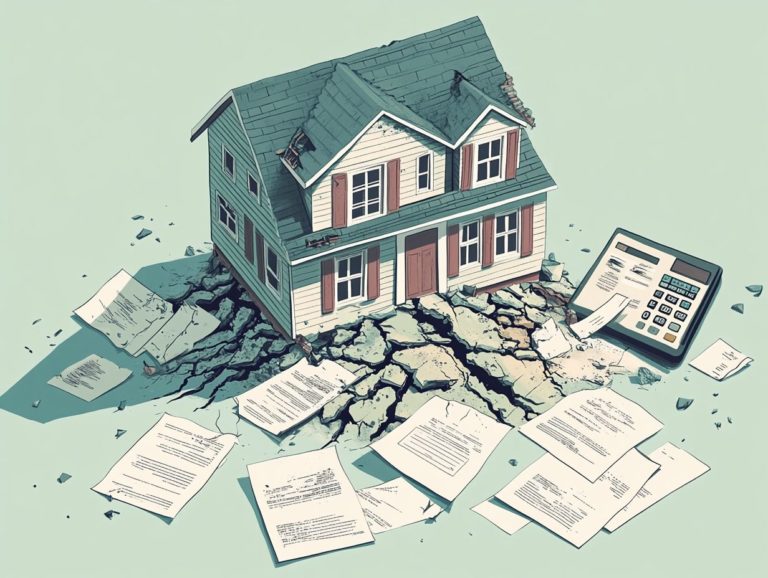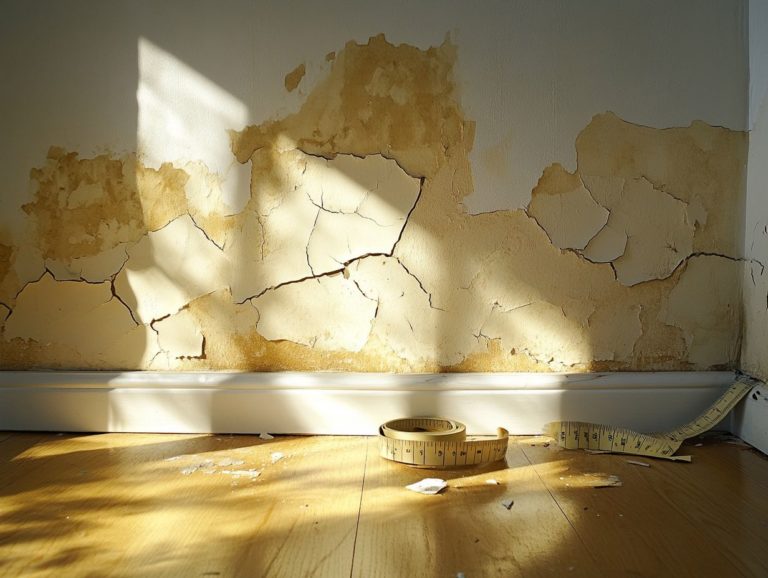Do I Need Home Insurance for My Rental Property?
Owning a rental property can indeed be a profitable endeavor, yet it also brings its own unique set of risks and responsibilities.
One crucial aspect that often slips through the cracks is home insurance. Grasping the details of home insurance for rental properties is vital for protecting your investment.
This article delves into what home insurance encompasses, its importance for landlords, the various types of policies available, key factors to evaluate before making a purchase, associated costs, and valuable tips for securing the right coverage.
Explore the details to ensure your rental property remains well-protected!
Contents
- Key Takeaways:
- Understanding Home Insurance for Rental Properties
- Types of Home Insurance Policies for Rental Properties
- Factors to Consider Before Purchasing Home Insurance for Rental Properties
- Cost of Home Insurance for Rental Properties
- How to Find the Right Home Insurance for Your Rental Property
- Frequently Asked Questions
- 1. Do I Need Home Insurance for My Rental Property?
- 2. What does home insurance for my rental property cover?
- 3. Can I use my regular homeowners insurance for my rental property?
- 4. Is it Required by Law to Have Home Insurance for a Rental Property?
- 5. What Happens If I Do Not Have Home Insurance for My Rental Property?
- 6. Can I Add My Tenants to My Home Insurance Policy?
Key Takeaways:
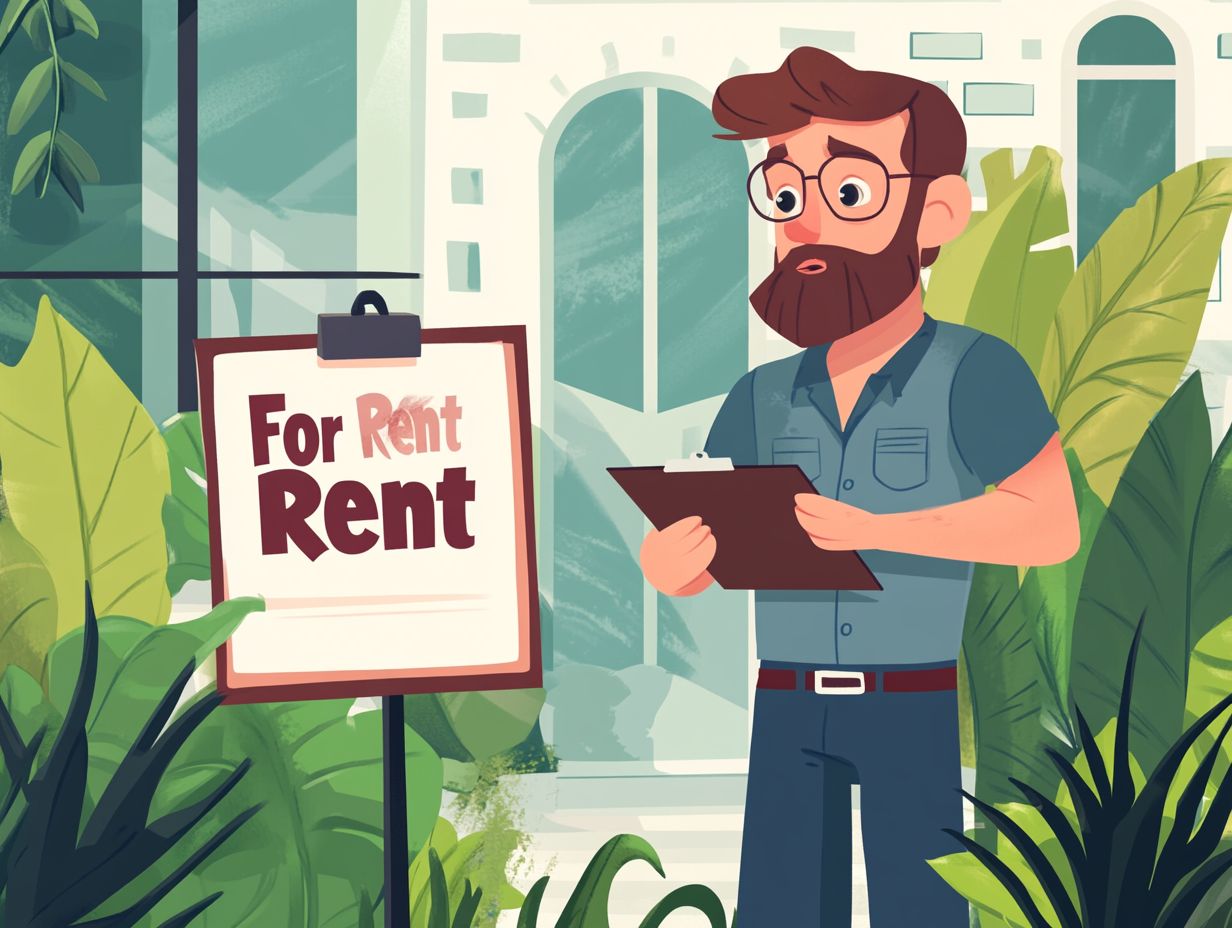
Here’s what you need to know about home insurance for your rental property. Home insurance is essential for rental properties to protect against potential damages, liabilities, and loss of rental income. There are different types of home insurance policies available, including landlord insurance and homeowners insurance with additional coverage options. When selecting home insurance for a rental property, factors such as location, property type, rental income, and tenants should be considered. Research and consultation with an insurance agent are recommended.
Understanding Home Insurance for Rental Properties
Understanding home insurance for rental properties is essential for landlords, homeowners, and investors alike. It not only protects your assets, such as dwellings and appliances, but it also offers insight into how home insurance protects landlords from legal claims related to rental agreements.
Having the right home insurance can help you mitigate financial losses from damages, claims, or liabilities. This ensures you re safeguarded against unexpected expenses that may arise from unoccupied or vacant rental units.
By exploring the various types of coverage available such as landlord insurance and standard homeowners policies you can empower yourself to make informed decisions that align perfectly with your property management strategies.
What is Home Insurance for Rental Properties?
Home insurance for rental properties is meant to protect you as a landlord or homeowner from potential losses or damages related to your rental units and investment properties. These policies often come with coverage tailored to your unique needs, such as landlord insurance that protects the building itself.
Landlord insurance covers liabilities arising from tenant injuries and accounts for lost rental income due to unexpected events like property damage. In contrast, homeowners insurance is more suitable if you occupy the property, focusing on protecting your personal belongings and liability for accidents that may occur within the home.
For example, while a landlord policy might cover damages caused by tenant neglect, a homeowner’s policy may not offer this benefit. Therefore, it s essential to evaluate your insurance options to ensure you have comprehensive protection.
Why You Can t Afford to Skip Home Insurance for Your Rental Property
Having home insurance for your rental properties is not just a good idea; it’s essential. It provides you with financial protection against unforeseen risks, covering expenses related to property damage, liability claims, and even loss of rental income in case of incidents. If you’re unsure about specifics, you might wonder, do I need home insurance for a second home?
Think of this type of insurance as your safety net, ensuring that your investments remain secure even in the midst of chaos. Did you know that nearly 50% of landlords face property damage every year, whether it s due to natural disasters, tenant mishaps, or vandalism?
Such unpredictable events can lead to significant repair costs that can really put a dent in your bottom line. Liability claims from tenants or visitors can escalate quickly, with payouts averaging around $30,000 per incident.
By securing home insurance, you can effectively mitigate these challenges, ensuring not only peace of mind but also the continued financial stability of your rental business.
Types of Home Insurance Policies for Rental Properties
When you’re exploring home insurance for your rental properties, it s essential to familiarize yourself with the various types of policies available. This includes landlord insurance, homeowners insurance, and specialized rental policies designed to meet specific coverage needs and address unique risks.
Understanding these options will empower you to make informed decisions tailored to your investment.
Landlord Insurance vs. Homeowners Insurance
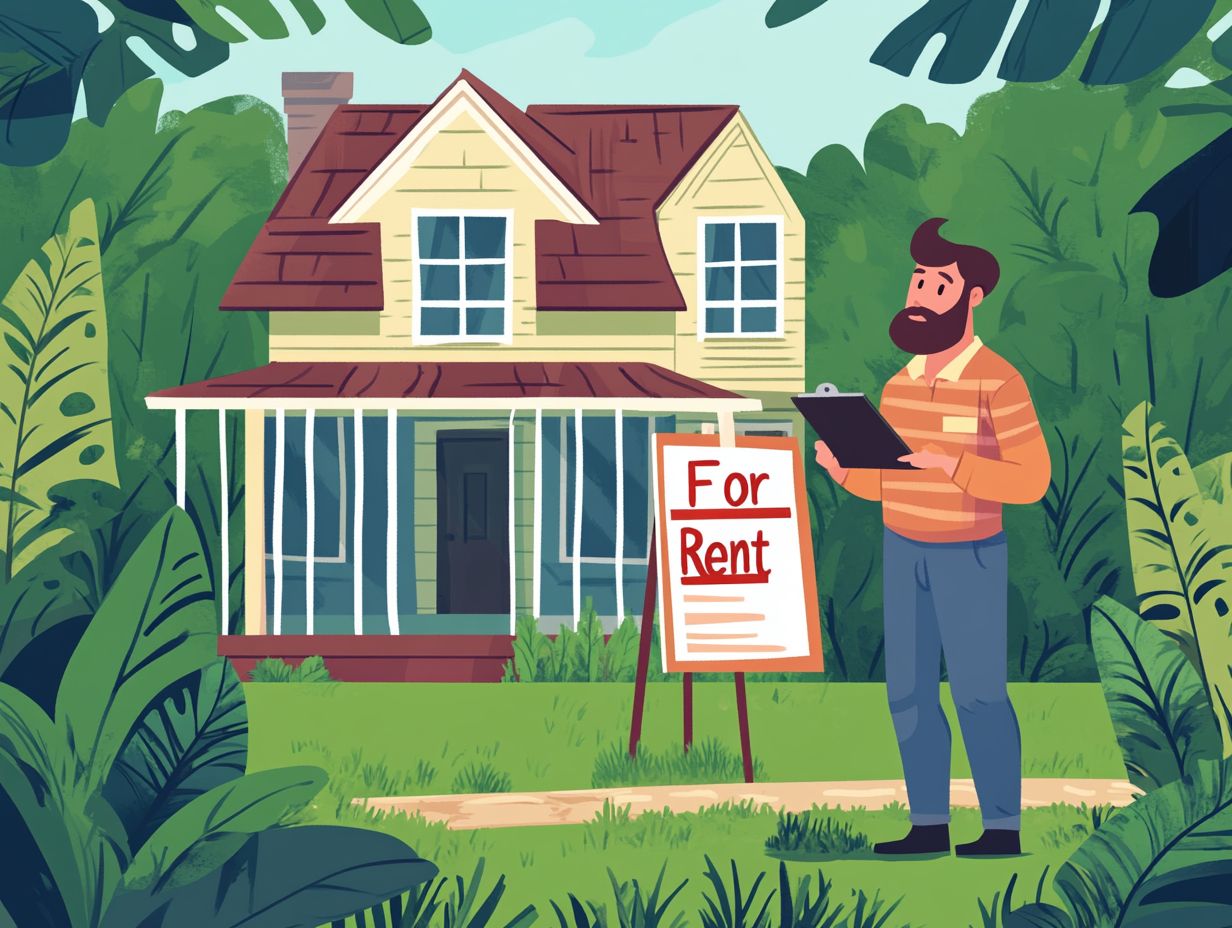
Landlord insurance and homeowners insurance play distinct roles and offer different levels of coverage. It is crucial for you as a property owner to grasp these differences before diving into a policy.
Homeowners insurance typically protects your personal property within the home and provides liability coverage for accidents occurring on your property. In contrast, landlord insurance focuses on safeguarding the rental structure itself and compensating for lost rental income due to issues like property damage or tenant defaults.
Landlord insurance often includes essential provisions for liability claims that may arise from tenants or their guests. This shields you from potentially costly legal battles.
Imagine this: a homeowner facing unexpected storm damage, which their homeowners policy might cover, versus a landlord dealing with a tenant injury claim where landlord insurance becomes essential.
Selecting the right policy is essential and aligns closely with your specific housing situation and investment objectives.
Additional Coverage Options
In addition to standard home insurance policies, you can explore a range of extra coverage options to enhance the protection of your rental properties against specific risks and potential losses.
These options can greatly boost the security of your investment, ensuring that unforeseen events like floods, earthquakes, or other natural disasters don t result in devastating financial setbacks.
For example, by adding flood insurance, you not only protect the physical structure of your property but also safeguard your rental income during periods of damage or loss. Similarly, earthquake coverage can cover repair and replacement costs, granting you peace of mind in high-risk areas.
These coverage options are invaluable for building strong protection, allowing you to focus on maximizing your investment without the constant anxiety of unexpected repairs and the financial repercussions that can accompany such incidents.
Factors to Consider Before Purchasing Home Insurance for Rental Properties
Before you make the decision to purchase home insurance for your rental properties, an in-depth evaluation of various factors is important.
Consider the location of your property, the type of property you own, the potential rental income, and the characteristics of your tenants. This careful assessment will help you choose a policy that not only meets your needs but also provides the right level of protection for your investment.
Location and Property Type
The location and type of rental properties you own can significantly influence the risks associated with home insurance, shaping the coverage options available to you as a landlord.
If your properties are nestled in coastal areas, they re often at risk for flooding and hurricanes. This means you ll likely need specialized flood insurance in addition to your standard policies.
If you manage urban apartment buildings, you might face different challenges, like theft or vandalism, which could require higher liability coverage. Similarly, if you re renting out vacation homes in picturesque settings, you may encounter unique issues, such as property damage from high tenant turnover.
By recognizing these geographical and property type nuances, you can make informed decisions about your insurance needs. This ensures you select the right coverage to protect against the specific risks your rentals may face.
Rental Income and Tenants
The rental income you generate from your properties, along with the characteristics of your tenants, plays a pivotal role in determining the necessary coverage and risks associated with home insurance for rental properties.
By understanding the diverse backgrounds and lifestyles of your tenants, you can gain valuable insights into potential liabilities. This ensures that you secure the right insurance.
If your tenants have pets, you might need additional coverage for possible damages. Conversely, tenants in a party-centric environment could elevate the risk of property damage or liability claims.
Recognizing these behaviors allows you to better assess your exposure to risk and select policies that not only protect your income but also address the unique circumstances of your rental situation. This tailored approach ensures financial protection while enhancing the overall rental experience.
Cost of Home Insurance for Rental Properties
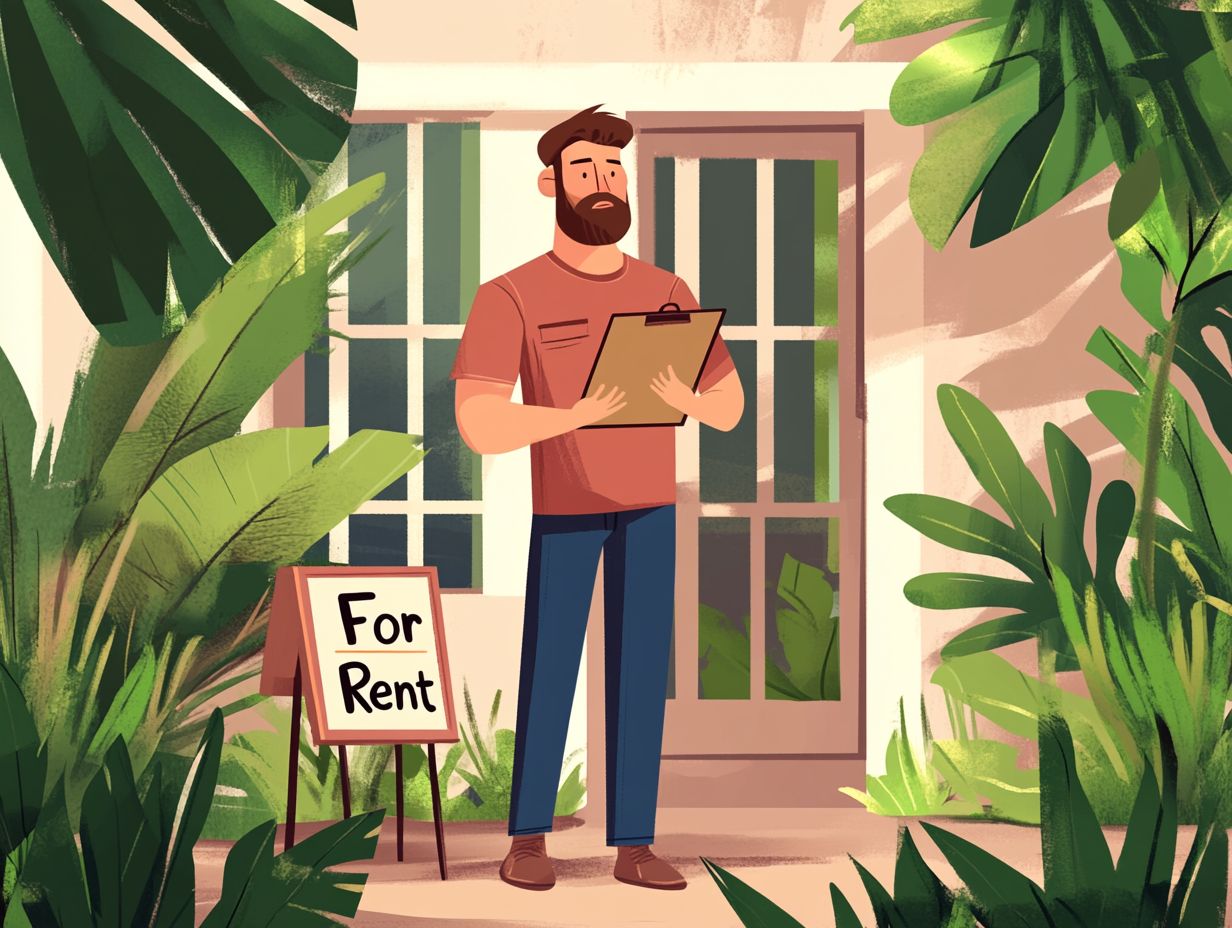
The cost of home insurance for rental properties varies widely. It’s influenced by several factors like coverage level, property characteristics, and local market conditions.
It s crucial for landlords to understand these elements when budgeting for insurance premiums.
Factors Affecting the Cost
Factors that affect insurance costs include location, construction type, and age of the property. Coverage limits you choose also play a significant role.
For example, if your property is in a flood-prone area, you can expect higher premiums than one in a low-risk zone. Older buildings and those made from unusual materials usually have higher costs due to perceived risks.
The coverage limits you select, such as liability coverage and personal property protection, are also key players in determining your overall premiums.
To keep costs manageable, landlords can take several proactive steps, such as:
- Increasing deductibles
- Bundling policies with other insurance types
- Implementing safety measures to reduce risks
This way, you can protect your valuable rental investments while keeping your insurance expenses in check.
How to Find the Right Home Insurance for Your Rental Property
Securing the ideal home insurance for your rental property requires careful research and comparison.
By exploring various policies, you can select the coverage that best fits your unique needs as a landlord or homeowner, ensuring that you are adequately protected.
Research and Compare Policies
Researching and comparing policies is crucial to finding the best home insurance for your rental properties. This process enables you to evaluate different coverage options and costs effectively.
By dedicating time to analyze various insurance plans, you can ensure that you select the most advantageous coverage tailored to your specific needs. Start by listing potential insurers and gathering quotes, carefully assessing each policy’s coverage limits to determine the extent of protection against various risks.
It’s also important to review endorsements that could enhance your basic policy, such as coverage for natural disasters or liability protections. Next, compare premiums to identify which plans offer the best value for the coverage provided.
Delving into customer reviews and ratings can provide valuable insights into insurers reliability and service quality, giving you the information to make well-informed decisions that safeguard your investments.
Consult with an Insurance Agent
Consulting with an insurance agent offers invaluable insights and tailored advice for selecting the most suitable home insurance for your rental properties. This helps you get the right coverage that fits your needs perfectly!
These professionals bring a wealth of knowledge to the table, expertly navigating the often complex landscape of policy options while highlighting coverage details that might otherwise escape your attention.
By engaging with an experienced agent, you gain a strategic partner who can identify the specific risks associated with your unique properties, ranging from natural disasters to tenant-related liabilities.
Agents can recommend insurance solutions that not only protect your assets but also align with your financial goals, making them an essential resource for effective risk management and peace of mind.
Frequently Asked Questions
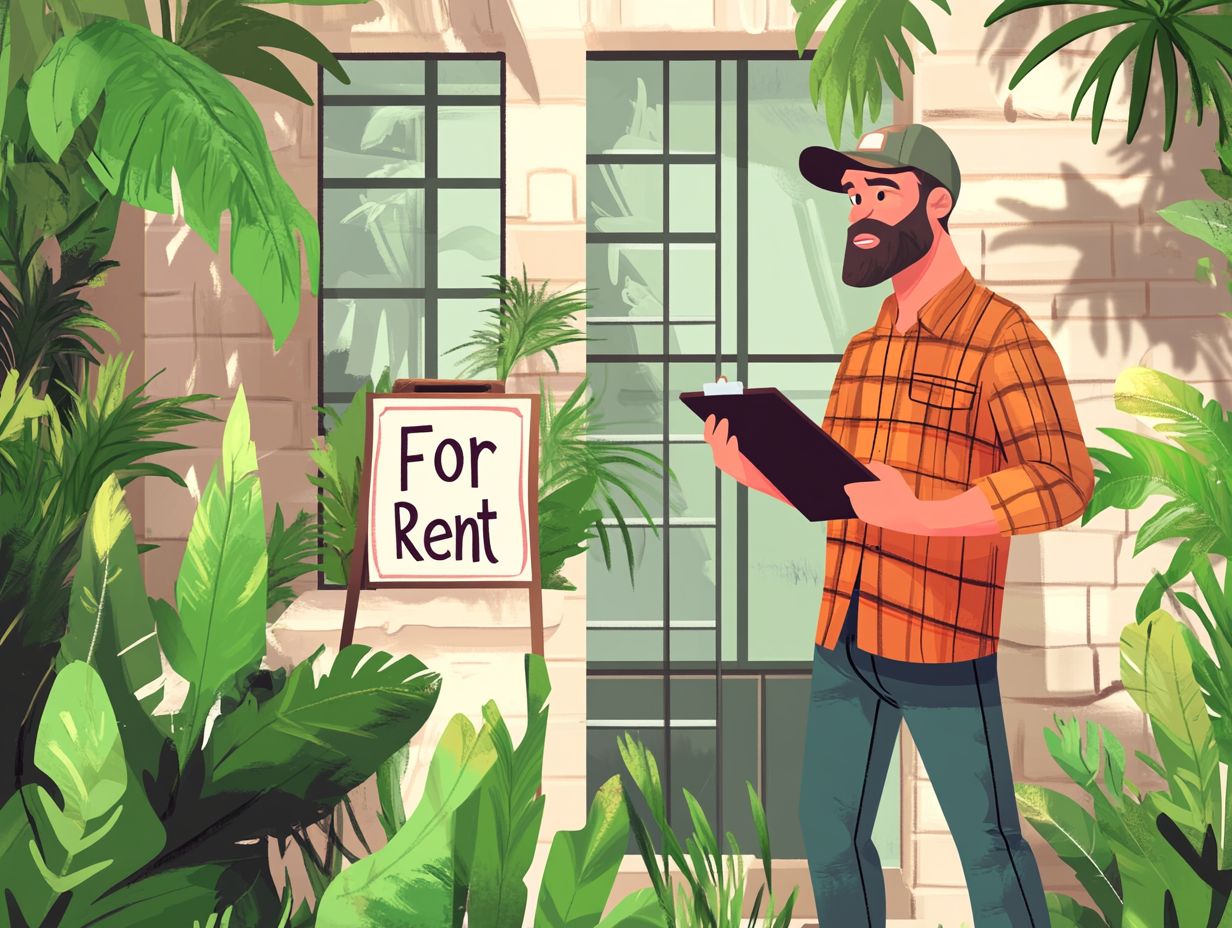
1. Do I Need Home Insurance for My Rental Property?
Yes, it is highly recommended to have home insurance for your rental property.
2. What does home insurance for my rental property cover?
Home insurance for your rental property typically covers damages to the physical structure of the property, as well as liability protection for any injuries or damages caused to others on the property.
3. Can I use my regular homeowners insurance for my rental property?
No, regular homeowners insurance is not sufficient for a rental property. You will need to purchase a separate policy specifically for rental properties.
Don’t wait! Start your search for the best home insurance today and protect your investments!
4. Is it Required by Law to Have Home Insurance for a Rental Property?
No, it is not required by law to have home insurance for a rental property. However, having insurance for a vacant home is a smart choice that helps you avoid losing money in unexpected situations.
5. What Happens If I Do Not Have Home Insurance for My Rental Property?
If you skip home insurance, you must pay for any damage or loss yourself. This can lead to hefty bills and serious legal problems.
6. Can I Add My Tenants to My Home Insurance Policy?
You cannot add tenants to your home insurance policy. They need their own renter’s insurance, which covers their belongings and provides liability protection in case of accidents.


